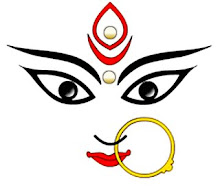
12 August 2009
SHAKTHI STHALAMS - BHAVANI TEMPLE AT TULJAPUR

Worship of the primeval energy Shakti in the form of the mother Goddess is seen in the four Shakti Peethas of Maharashtra - Tuljapur enshrining Bhavani, Kolhapur enshrining Mahalakshmi, Mahur enshrining Mahamaya Renukaand Saptshringi enshrining Jagadamba. Other Shakti temples in the state are those at Ambe Jogai and Aundh. (also see Daksha Yagna).
Bhavani was the tutelary deity of Maharaja Shivaji the valiant Maratha ruler and is held in great reverence throughout the state of Maharashtra. Bhavani is considered to be an embodiment of the ugra or ferocity, as well as a Karunaswaroopini - filled with mercy.
The Bhavani temple in Tuljapur is located on a hill known as Yamunachala, on the slopes of the Sahayadri range in Maharashtra near Sholapur. The temple entrance is at an elevation and visitors need to transcend a flight of steps to reach the shrine. Historic records speak of the existence of this temple from as early as the 12th century CE.
Bhavani is worshipped in the form of a three foot high granite image, with eigh arms holding weapons, bearing the head of the slain demon Mahishasura. Bhavani is also known as Tulaja, Turaja, Tvarita and Amba.
Legend has it that a demon by name Matanga wreaked havoc upon the devas and the humans who approached Bhrahma for help and upon his advice turned to the Mother Goddess Shakti, who took up the form of the destroyer, and powered by the other (Sapta) Maataas Varaahi, Bhrahmi, Vaishnavi, Kaumaari, Indraani and Saambhavi and vanquished him to enable to peace to reign again.
Legend also has it that Bhavani vanquished another demon who had taken the form of a wild buffalo (Mahisha), and took abode on the Yamunachala hill, which is now home to the temple.
Four worship services are offered each day here. The festivals of significance here are Gudi Padva in the month of Chaitra, Shriral Sashti, Lalita Panchami, Makara Sankranti and Rathasaptami. The deity is taken out in procession on Tuesdays. Navaratri is also celebrated with great fanfare, and it culminates in Vijaya Dasami.
Subscribe to:
Post Comments (Atom)























No comments:
Post a Comment